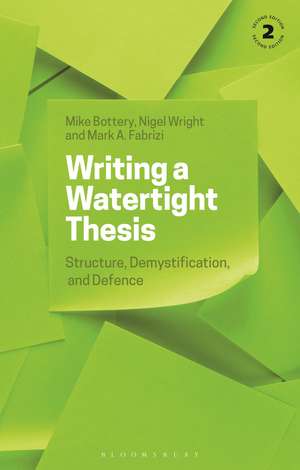Writing a Watertight Thesis: Structure, Demystification and Defence
Autor Professor Mike Bottery, Dr Nigel Wright, Mark A. Fabrizien Limba Engleză Paperback – 22 feb 2023
| Toate formatele și edițiile | Preț | Express |
|---|---|---|
| Paperback (1) | 149.02 lei 3-5 săpt. | +38.95 lei 7-11 zile |
| Bloomsbury Publishing – 22 feb 2023 | 149.02 lei 3-5 săpt. | +38.95 lei 7-11 zile |
| Hardback (1) | 407.76 lei 6-8 săpt. | |
| Bloomsbury Publishing – 22 feb 2023 | 407.76 lei 6-8 săpt. |
Preț: 149.02 lei
Preț vechi: 170.53 lei
-13% Nou
Puncte Express: 224
Preț estimativ în valută:
28.52€ • 29.91$ • 23.74£
28.52€ • 29.91$ • 23.74£
Carte disponibilă
Livrare economică 11-25 martie
Livrare express 25 februarie-01 martie pentru 48.94 lei
Preluare comenzi: 021 569.72.76
Specificații
ISBN-13: 9781350260597
ISBN-10: 1350260592
Pagini: 336
Ilustrații: 10 bw illus
Dimensiuni: 138 x 216 x 21 mm
Greutate: 0.45 kg
Ediția:2
Editura: Bloomsbury Publishing
Colecția Bloomsbury Academic
Locul publicării:London, United Kingdom
ISBN-10: 1350260592
Pagini: 336
Ilustrații: 10 bw illus
Dimensiuni: 138 x 216 x 21 mm
Greutate: 0.45 kg
Ediția:2
Editura: Bloomsbury Publishing
Colecția Bloomsbury Academic
Locul publicării:London, United Kingdom
Caracteristici
Supports the student in developing a structurally robust piece of work to submit, and one which can be defended in the viva or oral defence of the thesis
Notă biografică
Mike Bottery is Emeritus Professor of Education at the University of Hull, UK.Nigel Wright is Lecturer in Education at the University of Hull, UK.Mark A. Fabrizi is Associate Professor of English Education at Eastern Connecticut State University, USA.
Cuprins
Preface to the Second Edition Part I: Getting Ready1. The Need for a Watertight Thesis2. Demystifying the Doctoral Process3. What Does It Take to Complete a Doctorate?4. Making Sure That Your Doctorate is Original5. Structuring Your Doctoral ProposalPart II: Moving into the Doctorate6. The Supervisory Relationship: Roles, Models and Mystification7. Change and Problem-Solving in the Supervisory Relationship 8. Structuring in the Early Stages9. Focusing on the Major Research Question10. Creating Your Research Sub-QuestionsPart III: Moving through the Doctorate11. Linking the Research Sub-Questions to the Thesis Chapters12. Making the Early Chapters Watertight13. Judging the Doctoral Quality of Your Work14. Making the Middle Chapters Watertight15. Making the Later Chapters WatertightPart IV: Moving out of the Doctorate16. The Examiners' Need for Structural Clarity17. Preparing for the Summative Viva - and After18. Structuring and Publishing Your First Articles ReferencesIndex
Recenzii
A matchless guide to undertaking a doctorate that charts the doctoral journey with the voice of experience and demystifies the arcane. This impressively accessible commentary constitutes an essential primer for any doctoral aspirant seeking to create a watertight thesis and keep the venture afloat on an even keel.
I strongly suggest that doctoral students read Writing a Watertight Thesis. The wisdom and the experience of the authors helped me, a beginning researcher, to write a watertight thesis, leading me to a successful research and writing career.
The authors provide valuable guidance on questions doctoral candidates might ask and the roles that mentors might play to demystify the thesis/dissertation process. Through examinations of concurrent and consecutive curricular models for graduate studies, student-mentor relationships, and qualifications frameworks across nations, this text would well support the reader's research journey.
Producing a doctoral thesis which will satisfy examiners is a challenging task. This new edition continues with the idea of writing a 'watertight' thesis by examining the notion of originality to make this goal less daunting and indeed the book succeeds in making all the tacit processes associated with doctoral success clear and explicit. It will prove invaluable to both students and supervisors.
I strongly suggest that doctoral students read Writing a Watertight Thesis. The wisdom and the experience of the authors helped me, a beginning researcher, to write a watertight thesis, leading me to a successful research and writing career.
The authors provide valuable guidance on questions doctoral candidates might ask and the roles that mentors might play to demystify the thesis/dissertation process. Through examinations of concurrent and consecutive curricular models for graduate studies, student-mentor relationships, and qualifications frameworks across nations, this text would well support the reader's research journey.
Producing a doctoral thesis which will satisfy examiners is a challenging task. This new edition continues with the idea of writing a 'watertight' thesis by examining the notion of originality to make this goal less daunting and indeed the book succeeds in making all the tacit processes associated with doctoral success clear and explicit. It will prove invaluable to both students and supervisors.
